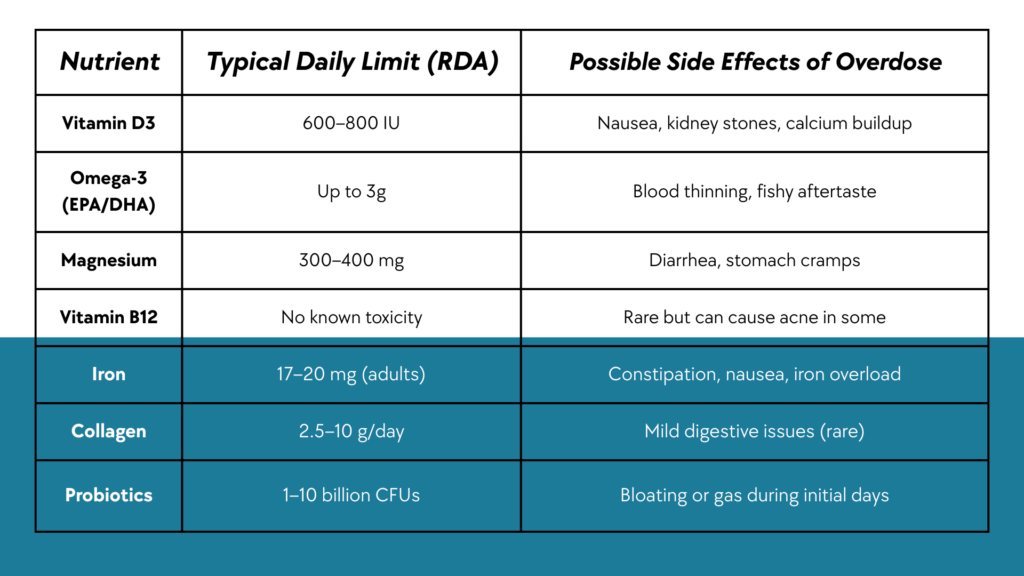
When you turn 30, it’s like your body gently tapping your shoulder and telling you, “Hey, it’s time to take me a little more seriously now.” Compared to your twenties, you may notice a slower metabolism, less energy, or higher levels of stress. And you know what?
The right supplements can help you keep up with life’s demands and stay on top of your game again.
Whether you’re a working professionals, a new parent, or just trying to stay ahead of health issues, by adding nutritional supplements to your daily routine could make all the difference.
In this blog, we’ll introduce you through the best supplements for people in their 30s, why your body needs them, and what you should know before picking one off the shelf.
Why Do You Need Supplements in Your 30s?
Let’s be real: Most of us try to eat healthily, but busy schedules and stressful lives can make it tough to get all the nutrients we need from food alone, especially since foods nowadays aren’t as nutritious as they once were.
By the time you hit 30, your body starts experiencing subtle but real changes:
- Muscle mass begins to decline.
- Bone density can start to drop.
- Energy levels may dip.
- Hormone imbalance become more noticeable.
- Stress and poor sleep.
That’s where multivitamins, vitamin D, and other essential dietary supplements come in. They fill nutritional gaps, boost your energy, and help your body handle everything from work deadlines to late-night Netflix binges.
Top Supplements You Should Consider After 30
Checkout the most popular and effective supplements for people in their 30s, whether you’re male or female. These are not just buzzwords-they’re backed by experts and loved by people who want to live healthier, longer lives.
1. Multivitamin: Think of this as your daily insurance policy. A quality multivitamin covers your bases for essential vitamins and minerals like vitamin A, vitamin C, vitamin D, vitamin E, and B vitamins. These help with energy, immunity, skin health, and even mood.
2. Vitamin D: If you don’t get much sunlight (hello, office life!), you might be low on vitamin D. This nutrient is crucial for bone strength, immunity, and overall well-being. Vitamin D supplements are among the most searched and recommended.
Helps absorb calcium efficiently:
- Supports joint and muscle strength
- Boosts immunity
3. Omega-3 (Fish Oil): These healthy fats support your heart health, brain function, and reduce inflammation. If you don’t eat much fish, an omega-3 supplement can make a big difference.
- Found in fish oil or vegan algae-based supplements
- Great for those with high-stress lifestyles
4. Magnesium: Feeling more tired than usual? Struggling to fall asleep? You could be low on magnesium. It helps with muscle function, stress management, and sleep. Many adults don’t get enough magnesium from their diet alone. You could be low on magnesium.
- Supports muscle recovery and nerve function
- Helps reduce anxiety and improve sleep quality
5. Zinc: Important for immunity and hormone balance, especially for men. Zinc supplements are easy to add to your routine.
6. Protein Supplements: If you’re active or trying to build muscle, a good protein supplement can help your body recover and stay strong.
7. Iron (for Women): Iron supports hemoglobin production and energy levels. Women in their 30s may need extra iron, especially if they have heavy periods and also important during and post-pregnancy. Iron supplements can help prevent fatigue and support overall health.
8. Collagen: ay hello to healthy skin, hair, and joints! Collagen production naturally drops in your 30s. So, Collagen supplements supports skin elasticity and joint health. This supplements are trending for a reason-they’re easy to add to smoothies or coffee too.
9. Vitamin B12: Often missing in vegetarian or low-meat diets, B12 helps with energy production and cognitive health.
- Vital for metabolism and red blood cell formation
- Especially important for working professionals and new parents
10. Probiotics: Gut health = overall health. A good probiotic supplement helps with digestion, immunity, and nutrient absorption.
- Reduces bloating
- Strengthens your immune system
How to Choose the Right Supplements (Without Getting Overwhelmed)
There are thousands of options on the market. Here are a few things to consider:
- Check the labels: Look for third-party tested supplements and certifications (like FSSAI in India).
- Understand your needs: Get a basic blood test or consult with a healthcare provider.
- Avoid megadoses: More isn’t always better. Stick to the recommended daily values.
- Read reviews and research: Stick to reputable brands.
Are There Any Side Effects or Limits to Taking Supplements?
This is a very common question, and an important one too.
Yes, even the ‘good stuff’ has its limits.
While health supplements can boost your wellness, excessive or unmonitored use can lead to side effects. Just like food or medicine, too much of anything can become a problematic.
General Dosage Guidelines
In India, the FSSAI (Food Safety and Standards Authority of India) sets clear limits on how much of each nutrient can be included in supplements. These are called RDA (Recommended Dietary Allowance) values.
Let’s break it down with a few examples:

Tip: Do not “self-dose.” Always read the label and stick to the suggested daily intake unless advised otherwise by a doctor or nutritionist.
Who Should Be Extra Cautious?
- Pregnant or breastfeeding women
- People with kidney, liver, or thyroid issues
- Those already on medications
FSSAI Guidelines on Supplements
In India, FSSAI regulates all aspects of nutraceutical and dietary supplements, including:
- Maximum permissible limits of vitamins and minerals
- Ingredient safety evaluations
- Labeling guidelines (e.g., “Not for medicinal use” warnings)
- Restricting false or misleading claims
Bottom Line
Don’t let all the choices confuse you. Think about what your body truly needs. Always pick good products from brands you trust. If you’re not sure, ask a doctor before taking any new supplement. Supplements don’t work the same for everyone. They can help a lot, but use them wisely. Taking more isn’t always better, and not everyone needs the same supplements.
Always aim for:
- Lab-tested, FSSAI-approved products
- Balanced doses
- Professional consultation if in doubt
A Quick Word on Regulatory Compliance
Many people don’t realize that in India, the FSSAI regulates health supplements, just like food and drugs. This means every health supplement you purchase must follow FSSAI guidelines for labeling and ingredient safety. Products that are mislabeled or don’t comply can be ineffective or harmful. Therefore, always buy supplements that are FSSAI-approved and made by licensed brands.
To finish up
It’s not complicated to take care of your health in your 30s. Good supplements can help you get the vitamins and minerals you might be missing, increase your energy, and keep you healthy in the long run. Just remember, supplements are only part of the picture. Eating well, exercising, and sleeping enough are also important.
Call to Action
If you’re unsure whether your supplement brand is FSSAI-compliant or if you’re planning to launch your own supplement product, getting professional guidance is a must.
At Shauryam Solutions Pvt. Ltd., we guide you through all the steps for FSSAI approval, product labeling, and other necessary permissions for food, health supplements, and Ayurvedic products. We make sure your products are not only good for your customers but also completely safe and legal.
People also ask
1. How do I know if I need supplements?
Fatigue, poor sleep, low immunity, or dietary gaps are common signs. A simple blood test or nutritionist consult can help.
2. Are natural supplements better than synthetic ones?
Natural supplements often have better absorption, but the quality of both depends on formulation and compliance with safety standards.
3. Do men and women need different supplements?
Yes, women may need more iron and calcium, especially around menstruation and pregnancy, while men might need more zinc or magnesium.
4. Are all supplements regulated in India?
Yes, under FSSAI. Any supplement sold in India must comply with FSSAI standards for labeling, composition, and safety.
5. Can I take multiple health supplements together?
Some can be combined, but it’s best to consult a healthcare provider to avoid over-supplementation or poor absorption.
6. How do I verify if a supplement is FSSAI compliant?
Check for the FSSAI license number on the label or consult professionals who specialize in food and nutraceutical compliance.





